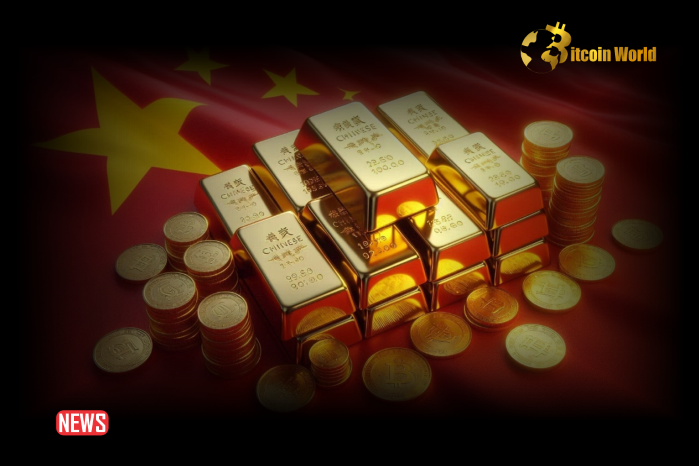Whispers in the gold market suggest a silent player is consistently accumulating the precious metal, and all eyes are turning towards China. Is the world’s second-largest economy secretly bolstering its gold reserves, all while keeping the market guessing? According to gold analyst Jan Nieuwenhuijs, the answer is a resounding yes. His latest report alleges that the People’s Bank of China (PBOC) has been discreetly buying gold, leveraging a clever strategy to avoid market ripples and capitalize on price dips.
The Secret Conduit: UK Bullion Banks
Nieuwenhuijs, a specialist in Chinese gold market dynamics, points to a fascinating tactic employed by the PBOC. Instead of direct, easily traceable purchases, he claims China is channeling its gold acquisitions through UK bullion banks. This indirect approach, utilizing non-traditional banking routes, effectively keeps these substantial gold buys off the official radar. Think of it as a secret back door to bolstering their gold reserves.
Report Highlights: China’s Unreported Gold Rush in May
The crux of Nieuwenhuijs’ report zeroes in on May, a month where the PBOC publicly declared a halt in gold transactions. However, Nieuwenhuijs’ analysis paints a different picture, suggesting a significant 53 tonnes of gold were secretly added to China’s reserves during this very period.
But how did he arrive at this conclusion? Let’s break down the evidence:
- Unexplained Gold Import Surplus: Nieuwenhuijs highlights a consistent pattern: China’s net gold imports have exceeded what the traditional market seems to absorb. This surplus, he argues, isn’t just disappearing; it’s likely being stockpiled.
- Shifting Market Dynamics Post-2022: Historically, there was a predictable relationship between China’s gold net imports, domestic mine production, and gold withdrawals. However, since 2022, this balance has been disrupted. Imports and production are outpacing withdrawals, indicating gold is accumulating elsewhere.
- Influx of Large UK Gold Bars: Adding fuel to the fire is the surge in large gold bars originating from the UK entering China. Intriguingly, these bars are not showing up in the vaults of the Shanghai Gold Exchange (SGE), the primary hub for gold trading in China. Where are they going then?
- Customs Data Revelation: Perhaps the most compelling piece of evidence is the revelation from a source confirming that central bank gold purchases are indeed included within customs data. This means that while the PBOC might not be explicitly reporting purchases, the data is still there, hidden within broader import figures.
Why the UK? And Why the Secrecy?
Nieuwenhuijs proposes that London, the heart of the global bullion market, becomes the ideal sourcing location. He suggests the PBOC might be leveraging the expertise and logistical capabilities of UK banks for these large-scale gold movements. “buys gold in England’s capital and lets banks supervise transport (maybe because the PBOC reaches the limits of its own capacity to ship gold when volumes are sizable),” he notes in his report.
The secrecy, according to Nieuwenhuijs, serves a strategic purpose: market cool-off. By underreporting gold purchases, the PBOC can prevent gold prices from spiking due to increased demand. This allows them to steadily increase their reserves at potentially more favorable prices. It’s a calculated move to avoid tipping their hand and driving up costs.
The Bigger Picture: A Massive Gold Stash and Dollar Debasement?
This isn’t the first time Nieuwenhuijs has raised eyebrows about China’s gold strategy. Back in March, he suggested that the PBOC could be holding a secret gold stash exceeding 5,300 tonnes. Why such a massive accumulation? Nieuwenhuijs believes it’s a strategic preparation for a potential future debasement of the U.S. dollar. Gold, often seen as a safe-haven asset and a hedge against currency devaluation, becomes increasingly valuable in such scenarios.
Could China be positioning itself for a shift in the global financial landscape, moving away from dollar dependence and towards a gold-backed future? While this remains speculative, the evidence presented by Nieuwenhuijs certainly paints a compelling picture of a nation strategically accumulating gold in the shadows.
What Does This Mean for the Gold Market?
If Nieuwenhuijs’ analysis is accurate, the implications for the gold market are significant:
- Understated Demand: Official reports might be underrepresenting the true demand for gold, particularly from central banks.
- Price Support: Consistent, albeit secret, buying from a major player like China could provide a strong underlying support for gold prices, even during periods of apparent market calm.
- Geopolitical Implications: Increased gold reserves could strengthen China’s financial standing and influence on the global stage, especially in a world potentially moving towards de-dollarization.
Your Thoughts?
China’s alleged secret gold buying strategy raises intriguing questions about market transparency and global financial power dynamics. Is this a smart move by the PBOC to diversify and prepare for future economic shifts? Or is it a form of market manipulation?
What do you think about China’s unreported gold purchases? Tell us in the comments section below.
Disclaimer: The information provided is not trading advice, Bitcoinworld.co.in holds no liability for any investments made based on the information provided on this page. We strongly recommend independent research and/or consultation with a qualified professional before making any investment decisions.



